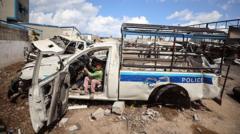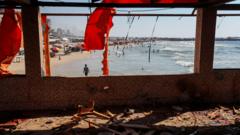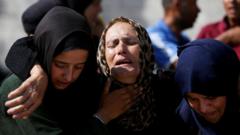A senior Hamas security officer has spoken out about the significant loss of control the group has experienced in Gaza, revealing that armed clans have begun to fill the void left by the organization's disintegration. Documenting a chaotic internal landscape since the onset of the recent conflict, the officer's anonymous voice messages provide insight into the collapse of Hamas’s security forces and their inability to maintain order amid ongoing Israeli airstrikes. With society devolving and rival factions gaining strength, the power dynamics in Gaza seem to be shifting dramatically.
Hamas Security Officer Reveals Loss of Control in Gaza as Clans Rise

Hamas Security Officer Reveals Loss of Control in Gaza as Clans Rise
As Hamas struggles to maintain authority, rival armed groups emerge in Gaza's power vacuum.
The officer, now sidelined due to injury, highlighted that approximately 80% of Hamas's control has evaporated, attributing this to relentless Israeli military operations that have decimated its leadership. "There's barely anything left of the security structure. Most of the leadership, about 95%, are now dead... The active figures have all been killed," he expressed in a stark assessment of Hamas’s current state.
He further noted that Israeli strikes have rendered any attempt at reorganization futile, prompting gangs and armed clans to flourish in the absence of effective oversight. "People looted the most powerful Hamas security apparatus... No police, no security," he said, illustrating the pervasive lawlessness gripping the region.
Among those filling the power vacuum are armed groups linked to local clans, empowered by access to resources and weaponry. One faction, led by Yasser Abu Shabab, has attracted attention from both the Palestinian Authority and Israel, which recently acknowledged supplying arms to his group. This emerging dynamic poses a serious threat to Hamas, with fears that Abu Shabab's growing influence could unify rival factions against the ruling group.
With the situation exacerbating, the Hamas officer warned of a dire future, stating, "If someone like Abu Shabab can rally those forces, that could be the beginning of the end for us." The challenges facing Hamas extend beyond external military assaults, now increasingly compounded by internal fragmentation and emerging opposition in what many are beginning to see as a new chapter in Gaza's tumultuous history.
He further noted that Israeli strikes have rendered any attempt at reorganization futile, prompting gangs and armed clans to flourish in the absence of effective oversight. "People looted the most powerful Hamas security apparatus... No police, no security," he said, illustrating the pervasive lawlessness gripping the region.
Among those filling the power vacuum are armed groups linked to local clans, empowered by access to resources and weaponry. One faction, led by Yasser Abu Shabab, has attracted attention from both the Palestinian Authority and Israel, which recently acknowledged supplying arms to his group. This emerging dynamic poses a serious threat to Hamas, with fears that Abu Shabab's growing influence could unify rival factions against the ruling group.
With the situation exacerbating, the Hamas officer warned of a dire future, stating, "If someone like Abu Shabab can rally those forces, that could be the beginning of the end for us." The challenges facing Hamas extend beyond external military assaults, now increasingly compounded by internal fragmentation and emerging opposition in what many are beginning to see as a new chapter in Gaza's tumultuous history.



















